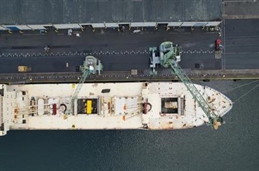
Port of Antwerp-Bruges said it is monitoring the impact of newly announced U.S. tariffs on its trading partners, including Europe, but noted that the effect remains minimal for now.
Europe's second-largest seaport made the comment as it reported growth in its container throughput volume for the first quarter of 2025, although overall tonnage handled by the port declined by 4% year-over-year, largely due to a sharp decrease in bulk volumes.
Container throughput served as a key growth engine in the first quarter, rising 4.6% in tonnage and 4.5% in TEUs compared to the same period in 2024, despite geopolitical uncertainties and container alliance restructuring.
Port of Antwerp-Bruges said the transition to the new alliances and strikes and congestion at other ports did, however, result in longer container dwell times and therefore put increased pressure on terminal capacity.
The Port of Antwerp-Bruges' market share in the Hamburg-Le Havre range increased to 30.5% in 2024, and on a global level, the port rose from 15th to 14th place in the ranking of the world's largest container ports.
The port noted that although some companies are acting in anticipation of tariffs, no clear export acceleration toward the U.S. has been noticeable so far.
"The impact of US import duties on traffic in Port of Antwerp-Bruges remains limited for now," it said, adding that container exports rose by 3.2%, while steel saw a temporary peak in January. Additionally, 20% fewer cars were exported to the US, in line with the overall decline in car exports.
It added that at the same time, structural factors, such as disrupted shipping schedules in containerised liner trade, model changes on the car market and temporary production suspensions, put increased pressure on terminals.
"So while the immediate impact remains limited for now, it is clear that further developments in the area of trade tariffs could have an effect on the logistics chain in the coming months," the port added.
Call for cooperation amid structural challenges
Port of Antwerp-Bruges also said that, in addition to trade tensions with the US, the European economy, and the industrial sector in particular, is also struggling with "structural problems" that are seriously undermining its competitiveness.
The port noted high energy and production costs, global overcapacity, and increasing competition from cheap imports from Asia and elsewhere are putting pressure on the sector.
On top of that, Port of Antwerp-Bruges cited "complex regulations, slow permitting processes, and high labour costs are interfering with the willingness to invest." It said that in recent years, the combination of these factors led to a sharp decline in market share, added value and production capacity.
"Port of Antwerp-Bruges and Port of Rotterdam are therefore pleading for a rapid implementation of the Clean Industrial Deal, in the form of concrete measures and sufficient budgetary support to restore resilience and future prospects for European industry," the port said, adding that the logistics chain remains vulnerable.
The port noted that the pilots' strike on March 31 temporarily shut down access to the port, resulting in millions of euros in economic damage and a visible impact on the port's operation and image.
"This disruption affected multiple links in the chain, from shipping companies and terminals to industry and transportation. With another national strike planned for 29 April, uncertainty remains high. The structural challenges, combined with mounting trade pressures with the United States, underscore the need for dialogue and cooperation," Port of Antwerp-Bruges added.
Jacques Vandermeiren, CEO Port of Antwerp-Bruges noted that the ever-evolving trade landscape also makes it challenging to predict future market outlook.
"We are in particularly uncertain times, which makes it difficult to predict what 2025 will bring next. But as in previous crises, our port is showing resilience and operational reliability. That stability is critical, both for our customers and for the broader economy."
"At the same time, the protectionist measures taken by the United States make it clear that Europe needs to make a stronger commitment to robust economic policies in order to strengthen our industry and anchor its strategic position," he added.
Meanwhile, the Port of Antwerp-Bruges said it continues to navigate global challenges, such as shifting market dynamics, geopolitical tensions, and the ongoing pressure on the European chemicals sector.
"With the United States as its second-largest trading partner, Port of Antwerp-Bruges is closely watching the evolving trade environment, as future tariff impacts become more pronounced," it said.



